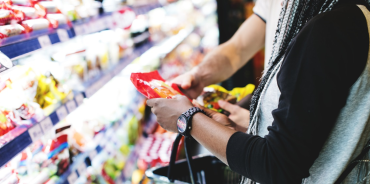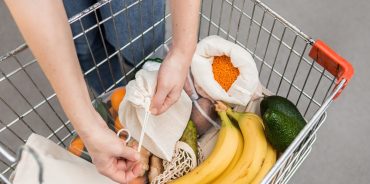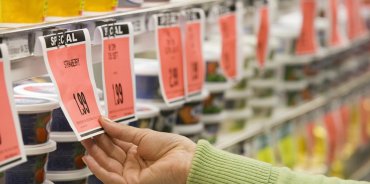Lessons from recessions part II: spotting similarities and differences
The global economy has experienced five recessions between 1970-2021: in 1975, 1982, 1991, 2009 and 20201. According to the IMF, half of the Europe and one third of the world is forecast to enter recession in 20232; with that, economic slowdown and recession are already at the forefront for grocery retailers and CPGs.
Predicting the future is always a difficult task. However, it may be possible to look at past recessions and compare to the current economic slowdown, in a bid to speculate how grocery should best respond.
Opportunities for foods
During the great recession, despite expectations, there was evidence of increased nutritional quality, at least within the US and UK where studies were conducted3, 4. This is because consumers were curbing on costs by visiting restaurants less and cooking from scratch more.
Whilst one can expect consumers are going to restaurants less due to inflation (see article on cost of living crisis); a key difference this time around is that household energy prices are still somewhat higher than normal, especially for the UK and parts of Europe5, 6, 7. This may lead some to avoid cooking from scratch in favour of foods that are perceived to be cheaper to process, such as ready meals, which only require heating, or switch to perceived cheaper methods of cooking (e.g. electric slow cookers; but also see a non-electric slow cooker called The Wonderbag).
Furthermore, as consumers venture out less during a recession, this may lead to more to have a ‘big night in’. A US study found that during the great recession starting in 2007, sales of alcohol increased8. How this may translate with increased alternatives outside of the category remains to be seen.
Opportunities for non-foods
There is some evidence which suggests that during the great recession, women decreased spend in clothing but treated themselves to increased spend on cosmetics9. This is sometimes referred to as the ‘lipstick effect’. However, due to Covid, some suggest there may be a wider focus on skin care10, perhaps this should incorporate personal care category in general?
Furthermore, as some customers may be spending more time at home in a bid to reduce costs, retailers and CPGs may need to find ways to increase home entertainment, such as video games, gardening or crafting.
Short-Term omnichannel effects
Given the costs of online delivery services, economic slowdown and recession may prompt customers to opt for cheaper click-and-collect slots or even to opt out of online altogether, particularly if there is a perception of online having a lesser assortment or a more expensive assortment. These effects may be moderated by online customers being relatively more affluent
Alternatively, customers may be seeking to reduce the costs of deliveries by paying for more monthly delivery slots at less busy days and times. The extent of these changes may further depend on the tradeoff between time and cost.
In the short term the growth of online may slow down but retailers should still keep their eye on the long-term growth of online.
Seven ways retailers and brands can respond
Provide customers with the following:
- Smaller pack options to decrease basket costs.
- Different themed food and drinks for a ‘big night in’, whether romantic date nights, family nights for different aged children or alternatives to dining out in restaurants.
- Home-cooked, natural ready meals for customers concerned about nutrition. Prove they are as good as a cooked from scratch meal and can save on cooking costs and time.
- Affordable meal kits, like recipe box delivery services, for those who want to cook to some extent but with minimum fuss. These offer decreased shopping time, recipe hunting time, food processing time, and reduce food waste.
- Provide products to help entertain customers whilst not going out or to teach new hobbies, such as gardening, crafting, video gaming, or puzzles.
- Highlight the small affordable luxuries to help the wellbeing of customers, such as personal care products.
- Greater range of delivery and click and collect options such as annual deliveries or eco options (i.e. deliveries when in the area)
Conclusion
Predicting the future is a tough business. However, in choppy macro-economic waters where predictions range from pessimistic 11, 12 to far less pessimistic 1, 13; there is a need to look at how the global economic slowdown or global recession may impact grocery shopping. To do this means looking to recessions past and to point out the similarities and their differences. The watch-out here is to not simply focus on the similarities but to be aware of the differences too.
References
1 Guénette, J.D.; Kose, M.A.; and Sugawara, N. (2022). Is a Global Recession Imminent? World Bank. https://www.worldbank.org/en/research/brief/global-recession
2 Euronews (Jan, 2023) https://www.euronews.com/next/2023/01/02/half-of-the-european-union-and-one-third-of-the-world-face-recession-in-2023-imf-warns1
3 Chen, A.Y.and Sturm, R. (2022). Diet Quality in the United States Improved during the Great Recession and Deteriorated During Economic Recovery. Journal of the Academy of Nutrition and Dietetics 122 (5): 974–980.
4 Monsivais, P. (2022). Healthy Eating in Hard Times? . Journal of the Academy of Nutrition and Dietetics 122 (5):909-912.
5 CNN (August, 2022) https://edition.cnn.com/2022/08/19/energy/energy-prices-uk-europe-explainer/index.html
6 Moneyweek (Jan, 2023). Will energy prices go down in 2023?
7 CNN (Jan, 2023). Natural gas prices haven’t been this low since Russia went to war. https://edition.cnn.com/2023/01/06/energy/natural-gas-pre-war-price/index.html
8 Bor, J.; Basu, S.; Coutts, A.; McKee, M.; Stuckler, D. (2013). Alcohol use during the great recession of 2008–2009. Alcohol and Alcoholism Vol. 48 (3): 343–348
9 MacDonald, D. and Dildar, Y. (2020). Social and psychological determinants of consumption: evidence for the lipstick effect during the Great Recession. Journal of Behavioral and Experimental Economics 86: 101527.
10 CNN (March, 2022) https://edition.cnn.com/2022/03/26/economy/recession-underwear-alan-greenspan/index.html
11 Harvard Business Review podcast (October 2022). https://hbr.org/podcast/2022/10/what-leaders-need-to-know-about-a-looming-recession-and-other-global-threats)
12 World Bank (Jan, 2023) https://www.worldbank.org/en/publication/global-economic-prospects
13 Reuters, (Jan, 2023) Goldman Sachs no longer expects recession in euro zone in 2023 https://www.reuters.com/markets/europe/goldman-sachs-no-longer-expects-recession-euro-zone-2023-2023-01-10/
TOPICS
RELATED PRODUCTS
A look at dunnhumby’s unique Customer Data Science, which is at the core of everything we do.
Data Science solutionsThe latest insights from our experts around the world
AI-powered, personalised loyalty: the next frontier in the pursuit of customer relevance
Six ways in which New Zealand’s suppliers can strike the balance between pricing and promotion




